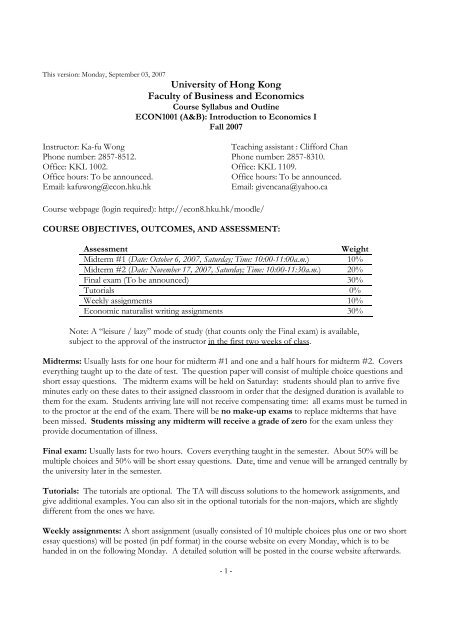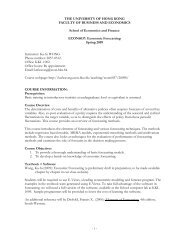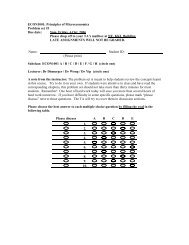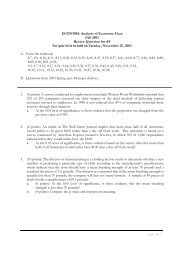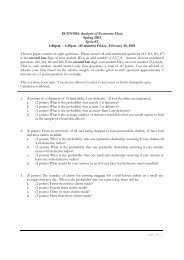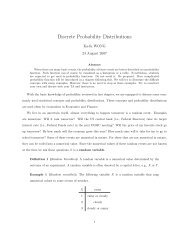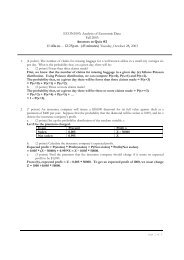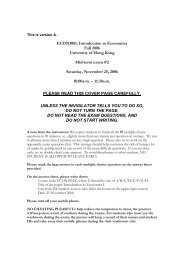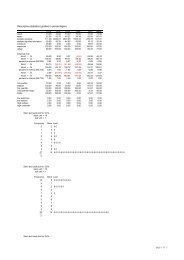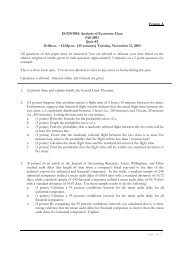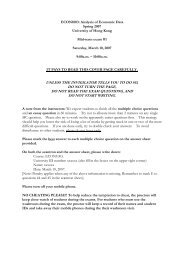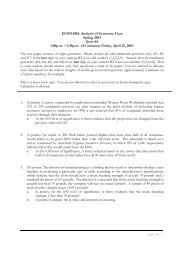Introduction to Economics I - Ka-fu Wong
Introduction to Economics I - Ka-fu Wong
Introduction to Economics I - Ka-fu Wong
You also want an ePaper? Increase the reach of your titles
YUMPU automatically turns print PDFs into web optimized ePapers that Google loves.
This version: Monday, September 03, 2007University of Hong KongFaculty of Business and <strong>Economics</strong>Course Syllabus and OutlineECON1001 (A&B): <strong>Introduction</strong> <strong>to</strong> <strong>Economics</strong> IFall 2007Instruc<strong>to</strong>r: <strong>Ka</strong>-<strong>fu</strong> <strong>Wong</strong>Phone number: 2857-8512.Office: KKL 1002.Office hours: To be announced.Email: ka<strong>fu</strong>wong@econ.hku.hkTeaching assistant : Clifford ChanPhone number: 2857-8310.Office: KKL 1109.Office hours: To be announced.Email: givencana@yahoo.caCourse webpage (login required): http://econ8.hku.hk/moodle/COURSE OBJECTIVES, OUTCOMES, AND ASSESSMENT:AssessmentWeightMidterm #1 (Date: Oc<strong>to</strong>ber 6, 2007, Saturday; Time: 10:00-11:00a.m.) 10%Midterm #2 (Date: November 17, 2007, Saturday; Time: 10:00-11:30a.m.) 20%Final exam (To be announced) 30%Tu<strong>to</strong>rials 0%Weekly assignments 10%Economic naturalist writing assignments 30%Note: A “leisure / lazy” mode of study (that counts only the Final exam) is available,subject <strong>to</strong> the approval of the instruc<strong>to</strong>r in the first two weeks of class.Midterms: Usually lasts for one hour for midterm #1 and one and a half hours for midterm #2. Coverseverything taught up <strong>to</strong> the date of test. The question paper will consist of multiple choice questions andshort essay questions. The midterm exams will be held on Saturday: students should plan <strong>to</strong> arrive fiveminutes early on these dates <strong>to</strong> their assigned classroom in order that the designed duration is available <strong>to</strong>them for the exam. Students arriving late will not receive compensating time: all exams must be turned in<strong>to</strong> the proc<strong>to</strong>r at the end of the exam. There will be no make-up exams <strong>to</strong> replace midterms that havebeen missed. Students missing any midterm will receive a grade of zero for the exam unless theyprovide documentation of illness.Final exam: Usually lasts for two hours. Covers everything taught in the semester. About 50% will bemultiple choices and 50% will be short essay questions. Date, time and venue will be arranged centrally bythe university later in the semester.Tu<strong>to</strong>rials: The tu<strong>to</strong>rials are optional. The TA will discuss solutions <strong>to</strong> the homework assignments, andgive additional examples. You can also sit in the optional tu<strong>to</strong>rials for the non-majors, which are slightlydifferent from the ones we have.Weekly assignments: A short assignment (usually consisted of 10 multiple choices plus one or two shortessay questions) will be posted (in pdf format) in the course website on every Monday, which is <strong>to</strong> behanded in on the following Monday. A detailed solution will be posted in the course website afterwards.- 1 -
Economic naturalist writing assignments: We would like <strong>to</strong> make you in<strong>to</strong> an economic naturalist –through two short writing assignments and through assessing the work of others.In each of these writing assignments, you will have <strong>to</strong> use a principle, or principles, discussed in the course<strong>to</strong> explain some pattern of events or behavior that you personally have observed. Don’t worry. You willsee numerous examples in the text and in class.The assignments should have an Asian context (not limited <strong>to</strong> China, Hong Kong, Macau and Taiwan, orJapan). Try <strong>to</strong> begin with a really interesting question. A really success<strong>fu</strong>l paper often begins with aninteresting question that makes the listener instantly curious <strong>to</strong> learn the answer. The remaining task is <strong>to</strong>use an economic principle or principles <strong>to</strong> construct a plausible answer. You’ll know you have a goodpaper if the first thing your roommate wants <strong>to</strong> do upon reading it is <strong>to</strong> tell their friends about it.Please do not write more than 500 words in each of the assignments. Many excellent papers aresignificantly shorter. Please do not use complex terminology. Imagine yourself telling your s<strong>to</strong>ry <strong>to</strong> arelative who has never had a course in economics. The best papers are ones that would be clearlyintelligible <strong>to</strong> such a person. Avoid using algebra and graphs. No need <strong>to</strong> include a bibliography. Noneed <strong>to</strong> do voluminous research in support of your argument. We are not writing a PhD dissertation.Nevertheless, a relevant fact or two might help convince yourself and others.Late assignments will not be accepted. The two assignments are due on Friday, Oc<strong>to</strong>ber 12 and Friday,November 23. Please write your assignment using your favorite software and copy and paste your writing<strong>to</strong> the corresponding page in our class website. Your submission will be graded anonymously. Please donot include any information (such as your name, student ID, email address, etc.) that allows other <strong>to</strong>identify the author.After each due date, we will ask 10 of your classmates <strong>to</strong> grade your submission, within a week, based onthe following criteria:o whether the question asked is interesting (a weight of 2/6),o whether the economic principle or principles are applied correctly and appropriately <strong>to</strong> analyze thequestion (a weight of 3/6), ando whether the submission is easy <strong>to</strong> read, i.e., on English writing and organization (a weight of 1/6).Our TA will grade all the submissions. The score for each submission is then computed as the weightedaverage score assigned by the 10 peer reviewers and our TA (unreliable assessments will be dropped). Theinstruc<strong>to</strong>r will read only the <strong>to</strong>p-scoring 10 or 20 percent of all submissions and decide if any of themdeserve additional bonus points (up <strong>to</strong> two points).On average, each student will have <strong>to</strong> assess 10 submissions. He or she will earn a grade from his/herassessment effort.The overall grade of the writing assignment will be a weighted sum of the submission grade (70 percent)and the assessment grade (30 percent).No plagiarism will be <strong>to</strong>lerated. Please refer <strong>to</strong> the section of Academic Conduct below for more details.Students can anticipate that grades will fall roughly along the following distribution:GradeA+, A, A-B+, B, B-C+, C, C-D and F- 2 -distribution20% of the class40% of the class30% of the class10% of the class
Statement Of Course Objectives, Outcomes And Assessment And Their RelationshipObjectives Outcomes Assessment1. Acquisition and internalization of Should know the <strong>fu</strong>ndamental principles and theories of Problem sets + Exams + writingknowledge of microeconomicsmicroeconomicsassignments + peer assessmentShould be able <strong>to</strong> use analytical <strong>to</strong>ols <strong>to</strong> formulate and solvemicroeconomic problems.2. Application and integration ofknowledgeShould be able <strong>to</strong> identify various microeconomic issues.Problem sets + Exams + writingassignments + peer assessmentShould be able <strong>to</strong> identify and use relevant informationShould be able <strong>to</strong> make trade-offs and informed decisions3. Developing global outlook Should demonstrate knowledge and awareness of internationalissuesWriting assignments with a focus onAsian issues4. Mastering communication skills Should be able <strong>to</strong> write effectively. Problem sets + writing assignments+ peer assessment- 3 -
Programme objectives, outcomes, etc. (Bachelor of <strong>Economics</strong> / Bachelor of Finance / Bachelor of <strong>Economics</strong> and Finance)Objective Outcomes Assessment Modes• Should know the <strong>fu</strong>ndamental principles and theories ofeconomics and finance• Should be able <strong>to</strong> use analytical <strong>to</strong>ols <strong>to</strong> formulate and solveeconomic and business problems1. Acquisition andinternalization ofknowledge ofeconomics & finance• Course-embedded assessment (assignments,tests/quizzes/examination)• External examiner’s assessment• Should be able <strong>to</strong> continue their graduate studies • Percentage admitted <strong>to</strong> graduate programs2. Application and • Should be able <strong>to</strong> distinguish between minor and major issuesintegration of• Should be able <strong>to</strong> identify and use relevant informationknowledge • Should be able <strong>to</strong> make trade-offs and informed decisions• Course-embedded assessment (assignments,tests/quizzes/examination, cases, projects)3. Developing globaloutlook• Should demonstrate knowledge and awareness of internationalissues• Course-embedded assessment (assignments,tests/quizzes/examination)• Percentage participating in field trips and exchange programs• Percentage participating in international competitions and forums• Should be able <strong>to</strong> <strong>fu</strong>nction in multicultural settings • Percentage participating in exchange programs• Effective contribution <strong>to</strong> study groups comprising internationalstudents4. Masteringcommunication skills• Should be able <strong>to</strong> articulate and make convincing and coherentpresentations• Should be able <strong>to</strong> write effectively• Course-embedded assessment (assignments, cases, projects)• Percentage participating in competitions and forums5. Inculcatingprofessionalism andleadership• Should demonstrate the capacity <strong>to</strong> deal with ethical and socialissues• Should adhere <strong>to</strong> and respect university regulations onacademic conduct- 4 -• Course-embedded assessment (assignments,tests/quizzes/examination)• Percentage participating in Internship programs• Percentage subjected <strong>to</strong> disciplinary action• Survey of employers of our graduates.• Should <strong>fu</strong>nction in teams effectively • Course-embedded assessment (cases and group projects)• Percentage serving on student associations, university dormi<strong>to</strong>ries,and external organizations• Percentage participating in external competitions and forums• Should display leadership traits • Course-embedded assessment (cases and, group projects)• Percentage serving as executives in student associations, universitydormi<strong>to</strong>ries, and external organizations• Percentage participating in leadership training programs, e.g., ILOP(Intensified Learning Opportunities Program), TILIP(Tufts Institutefor Leadership and International Perspective), AIPE (Asia Institutefor Political Economy)
COURSE INFORMATION:Prerequisites:The course is open <strong>to</strong> the B. Finance, B. <strong>Economics</strong>, B. <strong>Economics</strong> and Finance students only.Course overview:<strong>Economics</strong> is the study of human action. To understand how people can cooperate in social orders, andwhy they often cannot, we need <strong>to</strong> have a framework for understanding human action and itsconsequences. <strong>Economics</strong> provides one such framework. This is a course in microeconomics: the theoryof consumers, prices, and markets. Microeconomics has been applied <strong>to</strong> wide range of issues, from whatdetermines the price of consumer goods, <strong>to</strong> such things as how people vote, how much education theyacquire, and how many children they have.The purpose of this course is <strong>to</strong> actively engage students in the discovery of the economic content ofeveryday life. We will explore a range of <strong>to</strong>pics and applications concerning how individuals makedecisions about what <strong>to</strong> consume, produce, buy and sell, and how they interact with other consumers,producers, buyers and sellers in the marketplace. We will also address the role of government in thesystem, and policy areas such as regulation, antitrust, taxation, poverty and welfare.Textbook:Frank, Robert H. and Ben S. Bernanke (2007): Principles of Microeconomics, 3rd edition, McGraw-Hill.Additional readings:Additional readings will be assigned during the course, either distributed as handouts or available fordownload from the course webpage.Online study materials:1. The website that accompanies the text (http://www.mhhe.com/economics/frankbernanke3).2. PowerPoint slides for the lectures will also be accessible on the course webpage, before lectures.Course delivery:Lectures will be conducted by the instruc<strong>to</strong>r. There will be optional tu<strong>to</strong>rials. Discussions are welcome inclass and off class.ACADEMIC CONDUCTPlagiarism is defined as the unacknowledged use, as one's own, of work of another person, whether ornot such work has been published.A candidate shall not engage in plagiarism nor employ nor seek <strong>to</strong> employ any other unfair means at anexamination or in any other form of work submitted for assessment as part of a University examination.(Please refer <strong>to</strong> http://ec.hku.hk/plagiarism/introduction.htm for <strong>fu</strong>rther elaboration of the regulation.)- 5 -
COURSE OUTLINE (coverage is subject <strong>to</strong> change)Week Topic1 Thinking like an Economist (Chapter 1)Games and Strategic Behavior (Chapter 13, 453-466)2 Comparative advantage: the basis for exchange (Chapter 2)3 Supply and demand (Chapter 3)4 Elasticity (Chapter 4)5 Demand: the benefit side of the market (Chapter 5)Midterm #1 (Date: Oc<strong>to</strong>ber 6, 2007, Saturday; Time: 10:00-11:00a.m.)6 Perfectly competitive supply: the cost side of the market (Chapter 6)7 Efficiency and exchange (Chapter 7)8 The quest for profit and the invisible hand (Chapter 8)9 Monopoly and other forms of imperfect competition (Chapter 10)10 Strategic choice in oligopoly, monopolistic competition, and everyday life (Chapter 11)Midterm #2 (Date: November 17, 2007, Saturday; Time: 10:00-11:30a.m.)11 Externalities and Property Rights (Chapter 12)12 The <strong>Economics</strong> of Information (Chapter 13)* May also cover “Labor Markets, Poverty, and Income Distribution” (Chapter 14) if time permits.- 6 -


